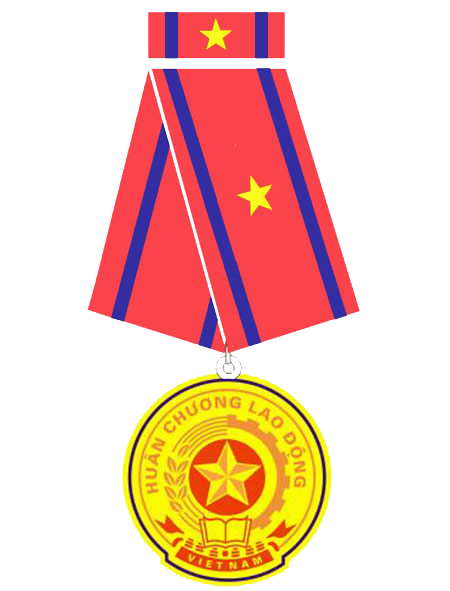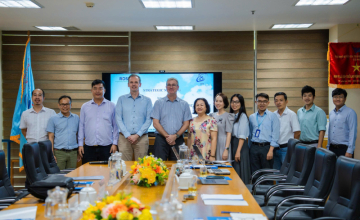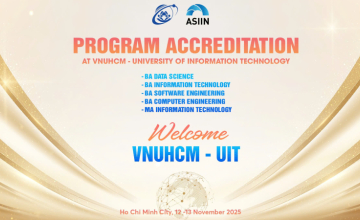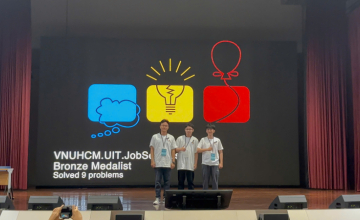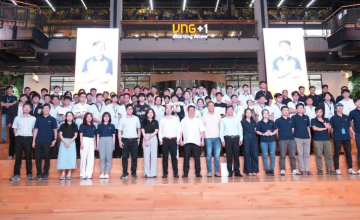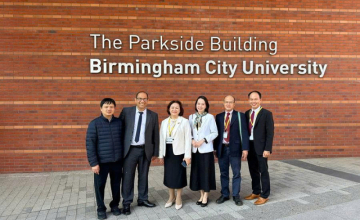1. INTRODUCTION
Doctorate in Information Technology program at the University of Information Technology- VNUHCM is taken charge by the Department of Science and Engineering Information.
The content of the academic training program is updated based on the mission and objectives of the training of the field, compared with the training programs in the field of information technology (IT) at the Vietnam National University Ho Chi Minh City as well as some other universities in the region and in the world.
1.1 Academic training objectives:
The general objective of the doctorate in IT training program is to train scientists in the field of IT with a high level of theoretical and practical ability, scientific thinking and independent research, to have the ability to create, to discover and solve new problems in science, technology and scientific research, to have access to and solve scientific problems.
1.2 Viewpoints for building academic training programs
The doctorate in IT training program is developed in the direction of self-study with the guidance of the scientific instructor and the specialized unit in charge; To attach importance to training methods and habits of scientific research and development of creative thinking in detecting and solving professional problems.
The program is designed and built based on:
· Refer to doctoral programs in information technology and communication of university members of Vietnam National University-HCMC and Hanoi National University.
· Associate doctoral program between Hanoi University of Technology and Sydney University of Technology.
· Refer to the IT graduate programs of universities in the world such as:
-
Virginia Tech University, USA
-
University of Technology, Sydney
-
Queensland University of Technology, Australia
1.3 Form and time of academic training:
The duration of doctoral training for holders of master's degrees is 3 years of continuous training; for those who have graduated from university but have not got a master's degree in relevant fields is continuous 5 years.
If postgraduate does not follow the continuous training and is accepted by the University; postgraduate’s training and research programs must have the total study time and study as stipulated above of which at least 12 months at the training establishment to carry out the research project. In this case the training time is one year plus for each subject.
2. APPLICATION OBJECTS
Doctoral degree in IT from 2014
3. TRAINING REGULATIONS
The doctorate program in IT of the University of Information Technology is based on:
· Regulation on doctoral training issued in conjunction with the Decision No. 25 / QĐ-ĐHCNTT-ĐTSĐH dated 15 April 2014 of the President of University of Information Technology (abbreviated as training regulation of the University of Information Technology) ).
· Regulations on training doctoral level, according to Decision No. 1020 / QĐ-ĐHQG-ĐH&SĐH on 10/09/2010 of the Director of VNU-HCM.
· Regulation on doctoral training issued together with Circular No. 10/2009 / TT-BGD & DT dated 07 May 2009 of the Ministry of Education and Training; and Circular No. 05/2012 / TT-BGDDT dated 15 February 2012 of the Ministry of Education and Training amending and supplementing Circular No. 10/2009 / TT-BGDDT, effective from 2/4/2012
4. LEARNING OUTCOMES
Graduates of doctorate programs in IT must meet the following requirements of learning outcomes (LO):
4.1 Knowledge
· LO 1: Having advanced, comprehensive and IT knowledge
· LO 2: Having independent research thinking, creativity, mastering core values, important in learning, developing principles and doctrines of IT majors.
· LO 3: Having the knowledge, ability to detect or know the organization of work, professional, directly solve the scientific problems in the field of IT. Having knowledge in integrated IT systems or inter-IT related systems.
4.2 Skills
· LO 4: Be skilled in detecting, analyzing complex issues and providing innovative solutions to problems.
· LO 5: Personal skills in logical thinking, independent research, creative and lifelong learning.
· LO 6: Having communication skills, national or international group formation and effective team leader.
· LO 7: Highly capable of presenting, presenting (in the form of articles, conference reports, undergraduate and graduate teaching) science issues in the IT field.
· LO 8: Good English skills, able to communicate, discuss with scientists, experts in English in the field of IT. Can write scientific reports, specialized reports.
· LO 9: Having the capacity to synthesize collective intelligence, to lead the profession, to handle issues of international scale.
4.3 Attitudes
· LO 10: Awareness of civic responsibility; Have proper professional attitude and ethics.
· LO 11: Be responsible, able to work independently or as a team player with professional conduct.
4.4 Capacity and position of employment:
After graduation, the doctorate in IT:
-
High knowledge and proficiency, grasp new IT technologies.
-
Have the ability to lead in the IT field that has been trained.
· Have creative ability to perform task; Self-directed, adaptable to the IT environment.
· Have ability to self-study, accumulate knowledge, experience to improve the level.
· Have ability to analyze and evaluate conclusions about expertise and some complex issues in the IT system.
· Have ability to plan IT systems, coordinate and promote collective intelligence.
· Have ability to improve and evaluate IT activities at medium scale.
· Have ability to lead the research team and apply new and multidisciplinary knowledge to develop IT products and applications in enterprises, research institutes or consultants, senior experts in organizations.
· Have ability to analyze practices to identify suitable designs for an integrated IT system.
-
Be able to teach undergraduate, postgraduate programs in IT
5. CURRICULUM
Pursuant to the Regulation on doctoral training of universities. IT, postgraduates must do the following three parts of the training program:
-
Part 1: Additional modules.
-
Part 2: Ph.D. theses, Ph.D. theses, general essays.
-
Part 3: Scientific research and doctoral dissertation.
5.1) Part 1: Additional modules
Additional modules are available for postgraduates who do not have a master's degree or have a master’s degree in the relevant field, which will help them to have sufficient knowledge and expertise to perform their duties.
Postgraduate does not have a master's degree and must study the supplementary basic subjects and the specialized subjects in the IT master curriculum in the current IT sector, not including the philosophy subjects to complete the IT master's degree courses.
Postgraduate holds a master’s degree in the relevant field, and then compares it with the existing master’s thesis. Postgraduate must study the missing subjects of the basic and specialized subjects in the IT master program. The list of supplementary subjects will be based on the current IT master's degree program as well as the Doctoral Entrance Examination.
Completion of additional modules is 5.0 or higher.
5.2) Part 2. PhD theses, doctoral theses, overviews
5.2.1 Doctorate modules
The purpose of the doctoral modules is to help postgraduate to update new knowledge in the field of specialization; improve the theoretical level, research methodology and ability to apply important and essential research methods in the field of research. Including 12 credits are 6 compulsory and 6 elective credits.
Completion points for doctoral degrees are 7.0 or higher.
In addition to 6 required credits, professional units and supervisors are based on the thesis's research to select elective subjects (6 credits) for postgraduate. List of IT PhD degree programs:
|
No. |
Subject code |
Module name |
Credits |
|
Compulsory module |
6 |
||
|
1. |
IT3001 |
Scientific research methodology |
3 |
|
2. |
IT3002 |
Advanced software technology |
3 |
|
3. |
IT3003 |
Modern networking and communication technology |
3 |
|
4. |
IT3004 |
Modern computer technology |
3 |
|
5. |
IT3005 |
IT system management |
3 |
|
6. |
IT3006 |
Information security and confidentiality |
3 |
|
7. |
IT3007 |
Knowledge technology and data |
3 |
|
Selective modules |
6 |
||
|
8. |
IT3008 |
Distributed algorithm |
3 |
|
9. |
IT3010 |
Speech recognition |
3 |
|
10. |
IT3011 |
Advanced topics in game theory and applications |
3 |
|
11. |
IT3012 |
Advanced topics in coding |
3 |
|
12. |
CS3101 |
Advanced Artificial Intelligence |
3 |
|
13. |
CS3103 |
Intelligent problem solving and application |
3 |
|
14. |
CS3105 |
Modern human-machine methods |
3 |
|
15. |
CS3112 |
Advanced Data Mining |
3 |
|
16. |
CS3113 |
Retrieve information |
3 |
|
17. |
|
Or elective subjects in the current MSc curriculum |
3 |
Note: Required doctoral courses or other optional doctoral courses are available upon request of the Scientific Advisory Board.
5.2.2 Doctorate theses
Postgraduate must complete 3 PhD papers (2 credits / thesis) before the scientific council established by the College of Technology (3 x 2 credits = 6 credits). The doctoral thesis requires postgraduate to update the new knowledge directly related to the subject of postgraduate, improve the capacity of scientific research, help postgraduate to solve some contents of the thesis. Completion of Ph.D. topics is 7.0 or higher.
Postgraduate must register for doctoral studies in accordance with its research direction with the approval of the instructor and the specialized unit.
List of in-depth directions suggested in doctorate thesis:
|
No. |
Code |
Intensive direction |
Credits |
|
1 |
IT3101 |
Advanced knowledge representation |
2 |
|
2 |
IT3102 |
Intelligent information system |
2 |
|
3 |
IT3103 |
Image processing and visual computing |
2 |
|
4 |
IT3104 |
Social network analysis |
2 |
|
5 |
IT3105 |
Demonstration of space time data |
2 |
|
6 |
IT3106 |
Ontology represents resources in teaching and learning |
2 |
|
7 |
IT3107 |
In-depth software testing |
2 |
|
8 |
IT3108 |
Data mining is based on raw file systems |
2 |
|
9 |
IT3109 |
Modern information system security |
2 |
|
10 |
IT3110 |
Randomized Kalman-Bucy-Stratonovich filtering |
2 |
|
11 |
IT3111 |
Robot Manipulation: computer control - robot |
2 |
|
12 |
IT3112 |
Processing video data |
2 |
|
13 |
IT3113 |
Ecommerce Data Mining |
2 |
|
14 |
IT3114 |
Online audio signal processing |
2 |
|
15 |
IT3115 |
Wireless sensor network |
2 |
|
16 |
IT3116 |
Speech recognization |
2 |
|
17 |
IT3117 |
Information security on mobile devices |
2 |
|
18 |
IT3118 |
Information processing and analysis system |
2 |
|
19 |
IT3119 |
Mobile positioning using Wifi |
2 |
|
20 |
IT3120 |
Network security and optimization |
2 |
|
21 |
IT3121 |
Computer vision |
2 |
|
22 |
IT3122 |
Computer graphics and visualization |
2 |
|
23 |
IT3123 |
Database management and data warehouse |
2 |
|
24 |
IT3124 |
Spatial information system |
2 |
|
25 |
IT3125 |
Analysis on big data |
2 |
|
26 |
IT3126 |
Parallel processing on big data |
2 |
Note: Other doctoral dissertations are updated at the request of the Scientific Advisory Board.
5.2.3 Overview essay
Postgraduate must conduct an overview of the research situation and issues related to the thesis, the essay requires the postgraduate to demonstrate the ability to analyze, evaluate, compare with the research. The authors of the theses and the foreigners are closely related to the dissertation topic, addressing the remaining issues, pointing out the issues that the thesis should focus on studying and solving. The overall essay score is 7.0 or higher.
Postgraduate conducts the essay report after completion of the doctoral dissertation and needs to successfully defend the essay review before submitting the dissertation.
5.3) Part 3. Scientific research and doctoral dissertation
Postgraduate must defend the dissertation thesis and be approved by the council of science and technology before the thesis.
The doctoral dissertation must find new results, not duplicate the research of others, solve a whole scientific problem, is a unique scientific research, accurate, honest, bright Create in the field of research, contribute theoretically, contain new knowledge or solutions that are valuable in developing, increasing the scientific knowledge of the field of research or solving creative problems. It is set up with a science or social practice, and abide by intellectual property laws of Vietnam and internationally.
The main contents and research results of the dissertation must be reported at specialized scientific conferences; published in at least two articles in independent scientific journals, scored by the State Council Professor, included in the list of scientific journals prescribed by the training institution for each training specialty. Encourage postgraduate to post in reputable international scientific journals listed at http://science.thomsonreuters.com/mjl/ or post them on the international scientific journal proceedings published by International prestige publications.
Postgraduate successfully defended the thesis before the specialized unit council and the board at the University level as required.
6. PLAN OF DEMO TEACHING
The duration of the doctoral program is two semesters in each school year and summer semester, with service from the library and the relevant units.
All doctoral degree programs for master degree holders are 3 years of continuous study; for those who have graduated from university but do not have a suitable master's degree is 5 years of continuous study are required. The instructional plan is divided into 10 phases, each period of 6 months.
Pursuant to the Regulation on doctoral training of University of Information Technology, expected time for postgraduate to complete the module:
-
Part 1. Additional modules: 24 months.
-
Part 2. Ph.D. modules, PhD topics, review essays: max. 24 months.
- PhD degrees.
- PhD topics.
- Overview essay.
- Part 3. Scientific research and doctoral dissertation:
- Scientific research: 24 months research.
- Ph.D thesis: done in 12 months.
Pursuant to the Regulation on doctoral training of the University of Information Technology, expected plan as:
|
Stage |
Academic year |
Knowledge blocks |
Accomplishment |
|
1 |
1 |
Additional modules |
Attend the corresponding graduate class. Supervisor and professional unit propose subject and submit to the President for decision. |
|
2 |
|||
|
3 |
2 |
||
|
4 |
|||
|
5 |
3 |
Compulsory module (6 credits) |
Proposal of Professional unit |
|
6 |
Selective modules (6 credits). |
Proposal of Professional unit and Supervisor |
|
|
7 |
4 |
Doctorate program 1 (2 credits). Doctorate program 2 (2 credits). |
Approval of Supervisor and Professional unit |
|
8 |
Doctorate program 3 (2 credits). |
Approval of Supervisor and Professional unit |
|
|
Start doing scientific research. Start the Essay Overview |
Postgraduate performs the overview dissertation, successfully defends the overview dissertation prior to submission doctorate dissertation |
||
|
9 |
5 |
Continue to do scientific research. Started the doctorate dissertation |
The doctorate dissertation is proposed by the professional unit and the President considers the decision. |
|
10 |
Continue to implement and defend the dissertation. |
.The professional unit organizes the committee of dissertation defense for postgraduate |
7. GRADUATION CONDITIONS
To qualify for graduation, postgraduates must meet the following requirements:
· Complete additional modules if they do not have a master's degree or have a master’s degree in the relevant field.
-
Completion of Ph.D. theses, Ph.D. theses, overview essays.
-
Completion of scientific research and doctoral dissertation.
· Must publish at least two articles in the independent scientific journal (within the list of articles are recognized Assoc.Prof., Prof.), reflect the research results of the thesis.

